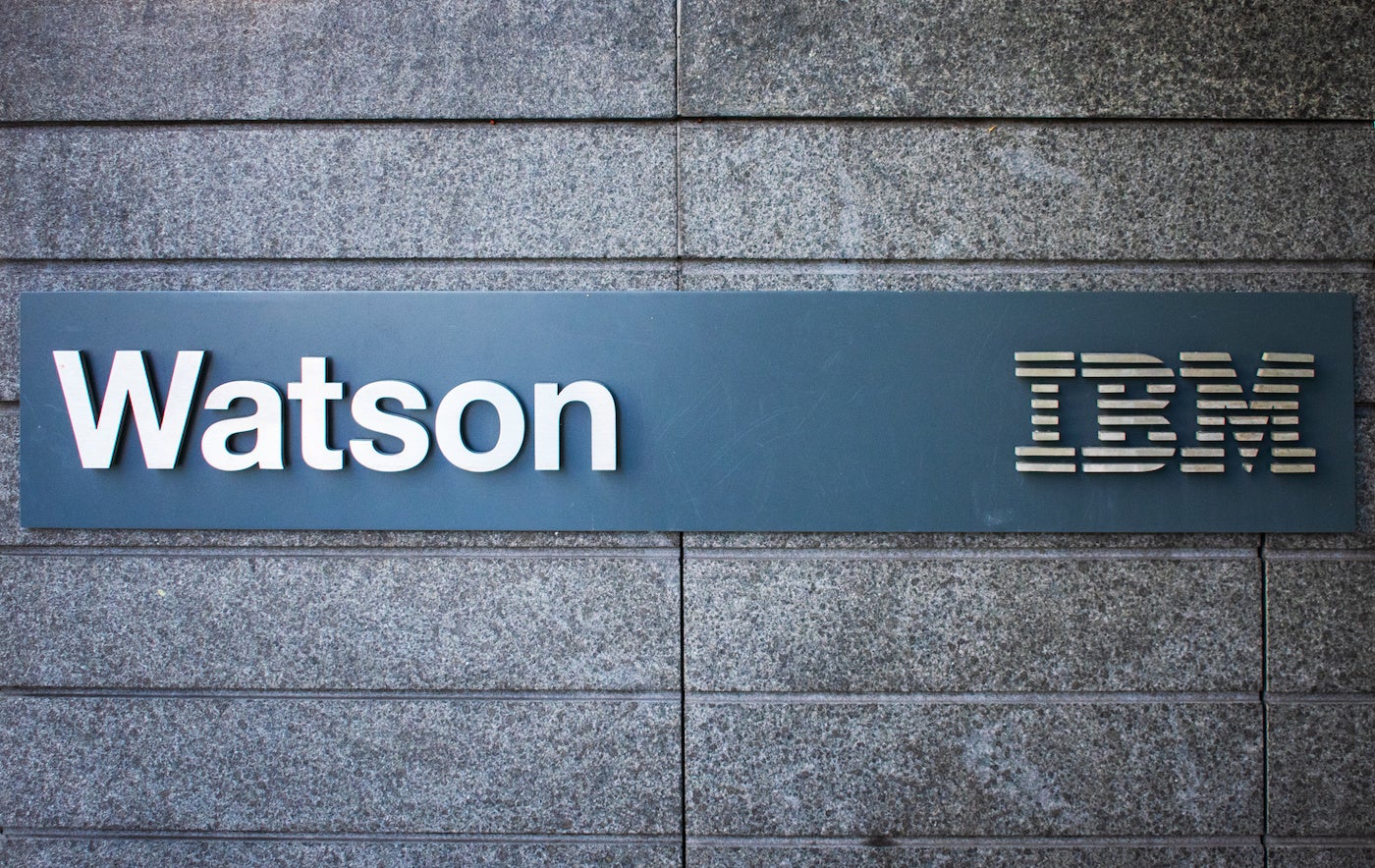IBM Watson is designed to make businesses more intelligent, so every member can perform at their best. It first garnered worldwide attention in 2011 as the computerized “brain” that won one million dollars on the TV game show Jeopardy! by beating human contestants. Since then, IBM has widely deployed Watson in many industry verticals and areas of application, and it has become the gold standard for purposeful analytics processing.
IBM Watson is an excellent data analysis platform integrated with advanced application programming interfaces, software-as-a-service application and specialized tooling. It leverages these tools for complex data analysis use cases and can be integrated with different platforms for optimizing daily tasks and enabling businesses to make the right decisions.
What is IBM Watson?
IBM Watson is a data analytics processor, named after IBM CEO Thomas J. Watson, that leverages natural language processing. This technology offers speech analysis to understand the syntax, context and meaning while translating it into actionable and practical answers.
SEE: Explore all of TechRepublic’s cheat sheets and smart person’s guides.
Watson was originally developed in IBM’s DeepQA research project. The primary goal was to develop a natural language-responsive system that could interpret questions asked in a human language, analyze vast amounts of data and return answers that it would take human researchers days, weeks or even months to derive.
Key features of IBM Watson
Cloud environment
IBM Watson’s cloud availability means companies can start small and pay for what they use. In addition, this means businesses won’t have to invest in in-house computing devices or hardware, which can be expensive.
API integration
IBM Watson is integrated with various APIs, allowing developers to combine different features of Watson into the business apps.
In addition, Watson APIs make incorporating conversation, language and advanced text analytics into applications easy. For example, Watson’s Natural Language Understanding can analyze text and return a five-level taxonomy of the content, concepts, emotion, sentiment, entities and relations.
Watson Orchestrate
Orchestrate provides automation for employees by streamlining processes and repetitive tasks accessed through open APIs and robotics process automation integrations. With Orchestrate, employees free up time to pursue more things on their “want-to-do” list, making them more effective.
Watson Assistant
Assistant builds better virtual agents to quickly get accurate answers across applications and devices from customer service to internal IT help desk and human resources teams. It delivers consistent and intelligent customer care across all channels and touchpoints with conversational AI.
Watson Code Assistant
Code Assistant enables developers with various levels of expertise to write code with AI-generated recommendations, making it easier for anyone to write code. Code Assistant brings the power of IT automation to the entire organization as a strategic, accessible asset for more users — not just the subject-matter experts.
How does IBM Watson work?
IBM Watson is deployed across a cluster of IBM Power servers, each running an instance of the software, and these servers communicate and work together to process large amounts of data and carry out complex tasks.
As a result, Watson can leverage parallel processing, meaning it can perform many tasks simultaneously by distributing them across multiple servers. Its parallel processing capability makes Watson extremely scalable, as additional servers can be added to the cluster to increase its processing power.
Use cases of IBM Watson
IBM Watson was initially developed to take months of research and provide answers within a few seconds or minutes. As a showcase of its processing power, in 2011, Watson won against human contestants on the game show Jeopardy!
Two years later, IBM announced the first commercial application of Watson with cancer research. Since then, IBM Watson has since become a common choice for various industries, including healthcare, engineering, education and entertainment.
Healthcare
Watson’s ability to process and understand large amounts of complex data makes it extremely valuable in healthcare. Watson can analyze medical literature, clinical guidelines and patient records to assist doctors in diagnosing diseases and suggesting treatments.
For example, the Watson for Oncology application can analyze a patient’s medical information and provide a list of potential treatment options based on current medical guidelines and data from similar patients.
Finance
Watson has been used in the financial industry to enhance customer service, risk management and financial forecasting. Watson’s natural language processing capabilities in customer service can build sophisticated chatbots that handle customer inquiries.
In addition, Watson can analyze various data sources for risk management to detect potential signs of fraud or other financial risks. Watson’s machine learning algorithms can also create more accurate financial forecasts by analyzing market trends and other relevant data.
Retail
Watson’s machine learning and natural language processing abilities create personalized shopping experiences in retail. For instance, Watson can analyze a customer’s shopping history and preferences to recommend products they might be interested in. Watson can also optimize inventory management by analyzing sales data and predicting future demand trends.
Who should use IBM Watson?
IBM Watson is one of the best choices for data scientists who want to develop unique algorithms and queries, as it can derive answers based on a variety of industry knowledge bases. As such, IBM Watson can be applied to different public sector organizations, companies and institutes.
IBM Watson APIs allows developers to incorporate advanced AI functionalities into their applications without developing and maintaining complex AI models. This can significantly accelerate development timelines and empower developers to build more intelligent and innovative solutions.
IBM Watson vs. other analytics applications
IBM Watson stands out from other analytics applications because it focuses on artificial intelligence and cognitive computing capabilities. While traditional analytics applications provide valuable insights based on historical data and statistical methods, Watson goes beyond that by incorporating AI, machine learning, natural language processing and other advanced technologies:
- AI-powered insights: IBM Watson’s AI offers the ability to analyze unstructured data like text, images and audio to provide deeper insights from diverse data sources, unlocking valuable information that would otherwise remain untapped.
- Natural language understanding: NLU capabilities enable users to interact with systems using natural language queries, making IBM Watson more user-friendly and accessible to a broader range of users and allowing nontechnical stakeholders to gain insights and make data-driven decisions easily.
- Machine learning integration: IBM Watson seamlessly integrates with ML algorithms, allowing users to build predictive models and perform advanced analytics tasks as well as streamlining the process of developing and deploying AI-driven solutions.
- Domain-specific solutions: IBM Watson’s domain-specific applications come with pretrained models, making it quicker for businesses to adopt AI in their specific fields.
- Natural language generation: IBM Watson’s NLG capabilities enable it to generate human-like written responses or summaries, which can be beneficial for creating reports, communicating insights and automating content generation.
Other analytics applications may excel in providing traditional business intelligence and data analysis capabilities, but IBM Watson’s AI and cognitive computing capabilities set it apart. All in all, IBM Watson allows organizations to derive deeper insights, automate processes and drive innovation in various industries and use cases.
IBM Watson’s competitors
MATLAB
MATLAB is a high-level programming language and interactive environment primarily used for numerical computing, data analysis, visualization and algorithm development. It allows users to perform complex mathematical operations and create applications for various scientific and engineering applications.
RapidMiner
RapidMiner is a powerful and user-friendly data science platform that enables organizations to efficiently build, deploy and operationalize predictive models and advanced analytics. It offers a visual workflow interface that simplifies the entire data mining and machine learning process, making it accessible to data scientists and business users.
Vertex AI
Vertex AI is a machine learning platform offered by Google Cloud that simplifies and accelerates the development and deployment of AI models. It provides a unified interface for data preparation, training, evaluation and deployment. This makes it easier for developers and data scientists to build scalable and production-ready machine-learning solutions.
Alteryx
Alteryx is a self-service data analytics platform that empowers users to prepare, blend and analyze data from various sources without the need for complex coding. Alteryx also offers a visual workflow interface that enables data blending, advanced analytics and data science tasks. This makes it accessible to both data analysts and business users for faster and more insightful decision-making.
SEE: Explore how IBM Watson compares to other competitors like Microsoft Azure and AWS IIoT Core.
How can I get IBM Watson?
Companies that can afford an investment into multiple millions of dollars can purchase an in-house IBM Watson system, which consists of several servers tethered together into a processing cluster. For companies without these resources, Watson can be accessed for free through the IBM cloud. For example, IBM offers a software developer’s cloud powered by Watson. It also provides a cloud-based global healthcare analytics cloud.

